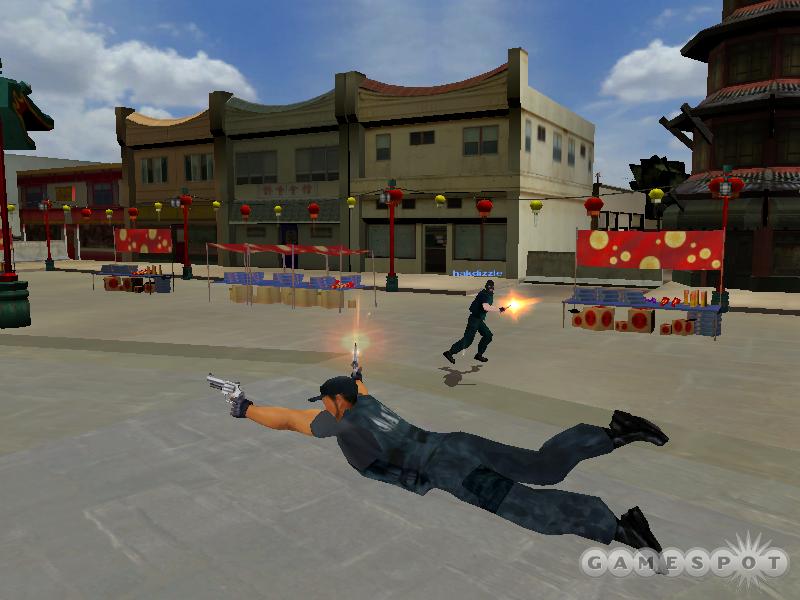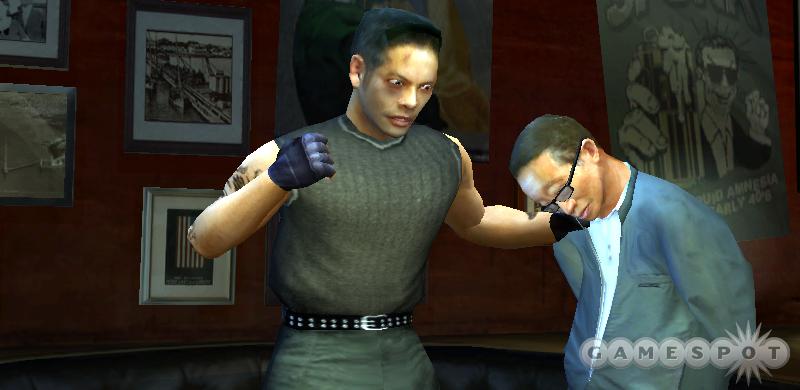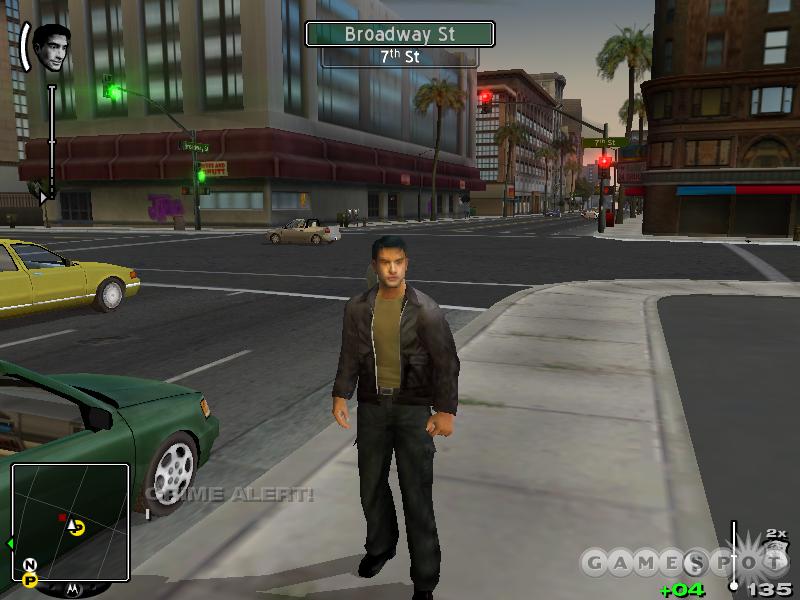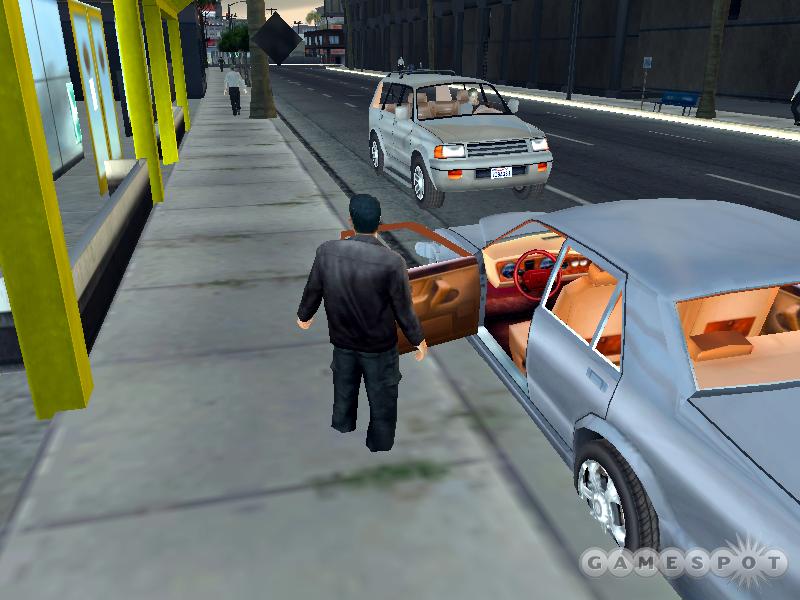As video games become more and more complex and realistic-looking, game developers are starting to look toward other media for inspiration. No longer is game creation as simple as inventing a character, creating a world, and plotting out a mess of sprites. With the increased power of today's platforms, game developers have to consider the best way to keep players immersed in a game's world--a process that touches everything from the gameplay to the graphics to the soundtrack. This sort of suspension-of-disbelief approach to design is something that moviemakers cope with every day, so it's really only natural for game developers to, at least, glance in that direction for a pointer or two. Activision and Luxoflux did more than simply take a glance with their latest game, True Crime: Streets of LA. The game itself is merely a vehicle for a premise and a plot that could have--and practically has been--done as a modern day action movie, full of clichés, catchphrases, and leap-of-faith twists and turns. Unfortunately, the game's transition from console to PC wasn't handled as smoothly as you might have expected, thus leaving a game that was already a little uneven feeling a little broken in some spots.

OK, action movie aficionados, stop us if you've heard this one before. In True Crime, you take on the role of a Los Angeles police officer, suspended indefinitely for unspecified infractions that have you classified as a "loose cannon" that no one else on the force wants to work with. But when the triads and the local Russian gangs start working together, you--and your tough, reckless take on everyday police work--are the LAPD's only hope. After quickly offending your new female partner by calling her a secretary and asking her to get you coffee, you take to the streets to set about solving this crime "your way." Along the way, you'll uncover some deep conspiracies, attempt to rescue your kidnapped brother, and even find out the truth about what happened to the father you barely knew--who, of course, was also an LA police officer who happened to vanish while investigating a particularly tough case. By the end, you'll have caused several things to explode, engaged in high-speed car chases, and shot holes in or broken the necks of just about every hardened criminal in the City of Angels. The story writers have managed to create a fairly genuine, albeit somewhat generic, take on the B-rate action movie plot.
In this action movie script, you'll play the role of Nick Kang, a recently reinstated cop. Unfortunately, the story's first problem surfaces almost immediately: Nick is almost completely unlikable. His alienation of his partner doesn't come across with the same happy-go-lucky-go-crazy nature of, say, Lethal Weapon's Martin Riggs. Instead, Kang just comes across as an unnecessarily cocky jerk from start to finish. His dialogue is stale, cheesy, smarmily delivered, and, in many cases, ripped from other movies. The way the character leans on catchphrases that aren't his (expect to hear him say such lines as, "See this? This... is my boomstick!" or "'Tis but a flesh wound!") takes you out of True Crime's world and is, in a nutshell, really dumb. That said, Kang's own one-liners aren't really any better at keeping things moving, and, overall, the lame main character is one of the game's larger problems.
While on the surface True Crime appears to be touching the same territory as Rockstar's Grand Theft Auto games, Luxoflux's game really has a lot more in common with Gathering's story-driven genre-crosser, Mafia. All three games give you wide-open spaces to drive around in. In fact, True Crime models 240 square miles of the Los Angeles area with a pretty high level of accuracy--except for the traffic, which is practically nonexistent. However, like Mafia, True Crime doesn't really lend itself well to aimless driving unless you're interested in seeing if your own personal Los Angeles landmarks have been included in the game. The game always gives you a place to go, but the story unfolds in a branching, yet ultimately linear, fashion. You'll receive one of three endings upon completing the game's final chapter, and, if you're really crafty, you can even unlock Snoop Dogg as a playable character with his own mode, or you can unlock a series of characters from other Activision games, like Pitfall Harry, Rikamaru from Tenchu, Officer Dick from the Tony Hawk series, and so on.
The different endings depend on how well you perform and what sort of cop you've been. A counter swings back and forth to keep track of your good cop/bad cop rating. Completing missions and properly solving the random crimes that pop up when you're driving from place to place makes you a good cop. Running down pedestrians and killing everyone you come into contact with makes you a bad cop. The random crime feature is a cool addition, but you'll start to see the same crimes (street fights, illegal racing, domestic disputes, and so on) over and over again. Also, the game's sense of justice is (commentary on the LAPD's occasionally controversial tactics aside) pretty insane. You can break up street fights with your pistol, but as long as you're only shooting people in the leg, you're still a good cop. In fact, you can even solve a lot of these crimes by simply driving up and running the perpetrators over. If you hit them too hard, you'll kill them, which makes you a bad cop. Hit them a little softer, and they'll just be knocked unconscious, which makes you a good cop. To be fair, you're given a lot of different options, such as firing warning shots in the air and flashing your badge, but a little bump from the front end of your car is really all the persuasion most small-time crooks need to let you arrest them. There's just something a little weird about stopping drunk drivers by shooting their cars until they either stop moving or they explode--that's all.

The random crimes are, in the grand scheme of things, pretty insignificant. The game is really about moving from mission to mission and from chapter to chapter as you uncover drug running, money laundering, other sorts of organized crime, and, well, zombies. Wait. What? Yes, you read that correctly. One of the game's chapters inexplicably pits you against the undead and other mystical creatures, and then you're back on the streets, doing cop work and tailing dirty cops. While there's something to be said for the game's random jaunt into such weird territory, it only serves to make the plot feel that much more disjointed and thrown together.
The gameplay is broken down into three types. Driving is how you'll get from place to place, and you'll encounter missions where you must escape pursuers, reach a specific location before a timer expires, or tail a suspect without getting too close and blowing your cover. Though you can commandeer any car that comes your way, most of them don't corner very well, and, overall, the driving feels a bit stiff. Over time you'll earn upgrades to your driving skills, which lets you execute burnouts and lets you skid to a stop. Additionally, you'll also earn new and improved vehicles.
There's an awful lot of gunplay in True Crime, making weapon control and firing another third of the gameplay. The PC version of the game retains the console game's auto-aim, but you also have access to mouse aiming, which is even more precise. But with the combination of lock-on targeting and mouse aim, wiping out your enemies is as easy as pressing the fire button as quickly as possible. Nick Kang can also execute Max Payne-like shootdodges, and the game even drops into slow motion when you execute this move. Nick usually fights by using two pistols with unlimited ammo, but you can also pick up weapons that may be lying around for a little extra firepower. Like your driving technique, your firearm skills can be upgraded as well. You'll earn new default weapons, an invaluable faster reload, faster aiming, and a laser sight, which improves your precision mode aiming skills.

The final of the three main types of gameplay in True Crime is also the most frequently encountered. You'll be using a lot of martial arts in the game, though usually in enclosed areas. The camera in these areas is fixed, which can be a real pain, since enemies will be able to get the jump on you while they're still offscreen. The game tries to teach you some tactics (hit high when the enemy blocks low and vice versa), but the hand-to-hand combat usually consists of wailing on the attack buttons, pausing occasionally to block, and hoping you land more shots than your foes. The environments in the game's many indoor fights are very breakable, and this fact, combined with some of the grapples and throws you'll eventually learn, makes for a cool show. For example, you can actually toss a stunned enemy into a guitar amp and watch as he gets electrocuted to death by the now-destroyed amplifier. While you'll unlock upgrades, such as new grapples, combo attacks, and the ability to execute attacks on enemies while lying on the ground, the hand-to-hand portion of the game isn't very interesting from a gameplay perspective. A little more strategy for the combat would have been a good touch, because what's there gets boring fast. Not even the inclusion of wrestling-style elbow drops, which are available as an upgrade, save the combat from tedium.
You'll also find a handful of stealth missions along the way that ask you to stay out of sight, but you can still sneak up behind foes and eliminate them either with a knockout blow (for good cops) or a lethal one (for all you bad cops out there). The fact that the difference between being a good cop and a bad one is as simple as hitting one button instead of the other is a little weird and serves to make the whole system feel a little ill-conceived.
True Crime's three different gameplay styles mesh pretty well, for the most part. However, the control in the game is, across the board, pretty terrible. You'll go from one set of keyboard controls for fighting, to mouse and keyboard controls for shooting, and back to the keyboard for driving. The controls are similar, but they're different enough that it's difficult to get the hang of things as you move from one scheme to the next, even after reconfiguring the controls a few times to find a better fit than the defaults. Even though this game is technically a third-person shooter (most of the time), it's still a game that controls better on consoles than it does with a mouse and keyboard. The fact that the PC version doesn't have any sort of gamepad support certainly doesn't help, either.
So True Crime trucks on from mission to mission at a brisk pace and tries its hardest to be a game that even the most casual game player can get through in some form or another. When you fail a mission, you're given the option to try it again, or you can simply carry on with the story. In some cases, this will cause the story to branch. For example, if you fail to get to a location on time and decide to continue down that path, you'll discover that the building has been torched in the extra time it took you to get there, and you'll lose an important lead. Eventually, all roads lead to a final confrontation, and the option to retry a failed mission, combined with the general ease of the game, means that getting the best ending isn't very difficult. In fact, most of the game's difficulty comes from frustration rather than genuine challenge. For example, you'll oftentimes fumble with the control or try to position the camera in a way that lets you actually see the action.
True Crime looked really solid for a console game when it was originally released back in November of 2003. Even though it's been less than a year since then, the PC version looks really dated. Things like textures, including those used on the streets and those used for the faces of characters in cutscenes, look low-quality and, to a lesser extent, washed-out. Even on a system that blows the game's minimum system requirements away, True Crime looks like a PlayStation 2 game that's been ported up, touched up a little bit, and shipped. That said, the game's rendition of Los Angeles is still pretty impressive. Los Angeles looks startlingly realistic, right down to the maze of freeway on- and off-ramps. What's more, the city streets don't look repetitive. The buildings along the streets are nicely varied, and you'll even pick out a few landmarks, like the Staples Center and the Los Angeles Convention Center. Just don't try driving up the street from the convention center in search of the Del Taco on Figueroa. It isn't there. The cars in the game are nicely detailed, and the lack of licensed ones means that you can bang up all the vehicles quite nicely. In fact, a shot to the gas tank will actually cause a car to explode in a fireball of destruction.
The interior sequences are dark and sort of ugly, but the breakable environments mask some of these flaws. Fights cause a lot of destruction, whether they occur in bars, butcher shops, or dojos. Clipping is a problem, whether you're inside or out, so you'll see cars clipping through the road, fighters clipping through one another, and so on. Overall, the whole game just looks sloppy.
The main addition to the PC version of the game is online multiplayer. But this four-player option feels like it was thrown in without much thought given to its design. The game offers a few different modes, such as a gun fight, a dojo battle, checkpoint races, or "the beat" (where the player who solves the most random crimes wins), but none of them are very fleshed-out. Dojo master, for example, dumps you into an arena, along with three other players. The object of the mode is to beat the heck out of one another until one player remains standing. Unfortunately, the fighting was never made for taking on this many players, so it just feels really slapdash. Lag also manifests itself by making the game stutter to the point of unplayability. As a result, low pings are a must. On top of all this, the game actually locked up on us a few times when playing multiplayer. All in all, the online mode actually detracts from the overall package rather than enhancing it to a point beyond its console brethren.
When it comes to creating something with a cinematic feel, a cohesive soundtrack is important. To this end, the console version of True Crime had one of the most amazing soundtracks we've heard in a game thus far, even winning our award for the best licensed soundtrack of 2003. The game contains three separate sets of songs to fit cruising, fast-action, and slow-action scenarios. The game contains more than 50 tracks in all, most of them of the West Coast rap variety, which fits the game's Southern California setting quite well. Artists on the soundtrack include Westside Connection, Snoop Dogg, E-40, Ice-T, The DOC, Lil Eazy-E, Sly Boogy, RBX, Mausberg, Warren G, and Kam. There are a few nonrap tracks on there as well, including songs from Megadeth and Taproot. As the game is M-rated, the songs on the soundtrack are presented in their entirety--uncensored. Furthermore, a lot of songs have been added to the soundtrack for the PC release, which mainly includes a smattering of metal and rock tracks in an obvious attempt to appeal to people who can't hang with the hip-hop. These tracks aren't good enough to stand up on their own, though, so it isn't much help. And in the end it only serves to water down the overall sound of the game, unless you go through and turn off the individual tracks that don't fit with the game.

The sound effects are well done, though cars, for some reason, sound incredibly underwhelming, like they're idling at all times. True Crime has a great deal of voice work in it. As previously stated, Nick Kang is constantly spouting off lame one-liners, and his cocky line delivery grows tiresome almost immediately. The rest of the voice in the game, however, is actually very good. Christopher Walken, serving as a narrator, of sorts, bookends the game's story and shows up here and there as an old-time cop who used to work with your father. He's the shining point of the audio, and it's a shame that he wasn't used more frequently. The game's stilted narrative certainly could have used the help.
In the end, True Crime is a game that really lacks polish and, in some cases, feels unfinished. It makes decent attempts with its different styles of gameplay, but none of them are particularly well done. Furthermore, the game's control is poor, and its storyline doesn't tie together in a satisfying way. Add to that an annoying lead character, a general lack of difficulty (which makes the game's eight chapters seem even shorter than they already are), and an ill-conceived multiplayer mode, and you've got a game that isn't really worth your time.